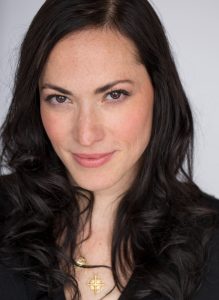Why should boys get to have all the fun? That’s one of the questions Kate Hamill asked herself as she began to refocus the Holmes and Watson stories to view them through the lens of a woman who had always felt left out of the “buddy stories” of literature, television, and film.

Kate Hamill / Sub/Urban Photography
“As a kid, I grew up watching these very famous buddy comedies like Ghostbusters and thinking, it’s so disappointing,” said the actor-playwright recently from New York. Even looking at the Arthur Conan Doyle stories (four novels and 56 short stories) and their myriad adaptations, Kate found that “there tends to be a peripheral woman, or maybe two, such as Irene Adler, but the boys are the ones getting to run around having all the real adventures.”
So Kate decided to create her own version, as she has done for a number of literary classics in recent years (Sense and Sensibility, Pride and Prejudice, Dracula, Little Women): a “radical feminist reclamation” of the Holmes stories, as she calls it, which places a female Sherlock and “Joan Watson” at the center of the drama, with five smaller male roles played by the same actor.
“I wanted to write it from a female-centered, feminist-centered point of view,” said Kate, whose adaptation of Jane Austen’s Pride and Prejudice graced the Rep stage in April 2019. “And I wanted to write it to be set more or less now.”
Ms. Holmes and Ms. Watson—Apt. 2B receives its world premiere this February 1st through the 20th on the Copaken Stage, marking the Kansas City Repertory Theatre’s first new play since COVID-19 shut down theaters worldwide.

Vaishnavi Sharma
Rather than 19th-century Victorian London, Kate’s play is set in the present day, and thus the idea of a female crime genius is not as foreign as it might be. And as with all good mystery stories, it begins with more questions than answers: For instance, what COVID-19 trauma has driven the American Watson (played by Kate herself) to flee to London? And how does it impact the storytelling that Holmes is not an old white guy but instead is played by the eminent India-born actress Vaishnavi Sharma?
How does Irene Adler (one of several female roles played by Vanessa Severo) serve as both love interest and villainess? Why are none of the five male characters (played by Jason O’Connell) named on the cast list? And finally, is “Apt. 2B” some sort of Shakespearean pun?
Central to this tale is the odd couple friendship of Holmes and Watson: They form the sort of buddy team we normally see played by men (from Don Quixote and Sancho Panza to Laurel and Hardy, from Butch and Sundance to Garth and Wayne) but rarely by women. And Kate said she’s based the friendship partly on some of the roommates she had during her salad years as an actor-playwright, one of whom was Vaishnavi herself (whom many will know as Elliot’s Mom in USA Network’s Mr. Robot).

Jason O’Connell / Photo by Xanthe Elbrick
“In my life I have found that female friendships, especially with women you live with at a certain stage of your life, are kind of very intimate, asexual relationships: they’re like an asexual spouse.” Kate wanted to establish that female buddies can be “prickly, and have rivalries, and also love each other, and be codependent: a sort of realism in the midst of two women living together … where they’re both struggling with some pretty profound burnout.”
Like most authors of the past, Arthur Conan Doyle viewed the world with what many today call “the male gaze,” a phenomenon that Kate would like to counter. (Even today, three-quarters of new plays produced in the United States are by men.)
“The male gaze is something that we normalize,” said José Zayas, who directs the production. “It’s the way that we think these stories are supposed to be told… from the perspective of the privileged white man who goes through this narrative talking about his problems from his perspective, and everybody else is there to help him on his journey.”
Part of the problem with Arthur Conan Doyle’s Holmes is that he is the type of “tortured genius” that fascinates us, to the point where we put up with behavior that is often appalling. “He is a problematic figure, in a way, because he is abusive,” José said. “And we have allowed people like that in our lives: like the ‘genius director’ in theater, where it’s all right for him to abuse everyone and we can still admire him.”

José Zayas
That’s all changing today, and, in fact, what José likes about Kate’s drama is that it has swiveled some of the attention away from Holmes. “Watson becomes the mystery to solve,” José said. “What is really wrong with Watson? Why is this American doctor leaving her life in New York City to come to London? What happened?”
Watson is also (here as in many versions of these stories) “the access point into how we all understand Holmes’ mind,” José added. “Holmes is a ‘glorious’ monster in many ways, and Watson allows us access to him.”
What José finds especially remarkable about the Holmes-Watson narrative is the extent to which it has become a blueprint for so many retellings. “It is one of the great sources of buddy-mystery-solving-duo stories,” he said. “We can see the fingerprints of it everywhere: in so much of the literature and so many of the movies and the TV that we watch. And the fact that it is still present, that people are still adapting it and finding new ways of entering it, speaks to its power… its ability to hold onto our imagination.”
Stuart Carden, the Rep’s artistic director, has long admired Kate’s “reclamations” and hopes that such works can help move the Company toward more female-centric storytelling. Kate’s works “tease out ideas ‘in conversation with’ the original writing in a manner that can open audiences up to new ways of thinking,” Stuart said.

Vanessa Severo
The classics “can hold so many different interpretations: They have stood the test of time because they speak to every generation, through universal themes and universal relationship dynamics.”
Stuart was drawn to the idea of a female crime-fighting duo partly because of the boldness of Kate’s vision for it. “There’s physical comedy and fight choreography, and there’s blood and chaos… of the kind that traditionally men have been able to do,” he said. “She’s intentionally writing a piece that allows women to be at the center of that kind of theatrical fun and mayhem.”
—By Paul Horsley
For tickets, call 816-235-2700 or go to kcrep.org.
To reach Paul Horsley, performing arts editor; send an email to paul@kcindependent.com or find him on Facebook (paul.horsley.501) or Twitter/Instagram (@phorsleycritic).